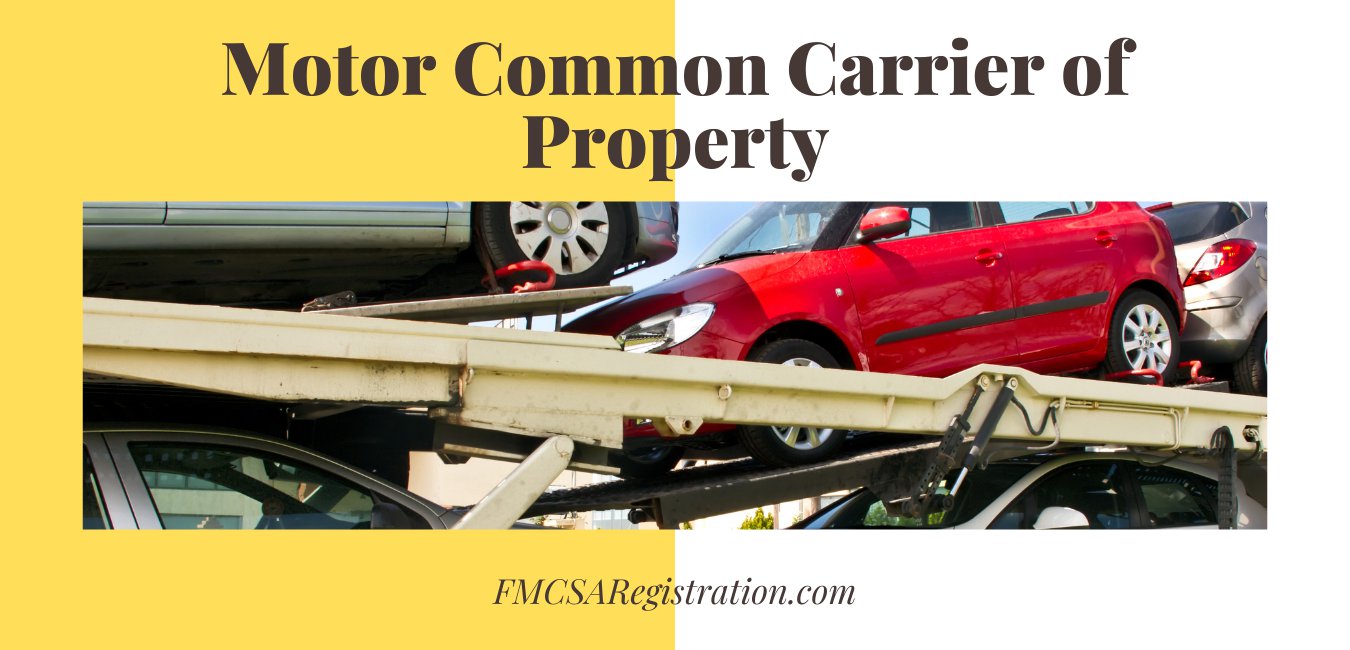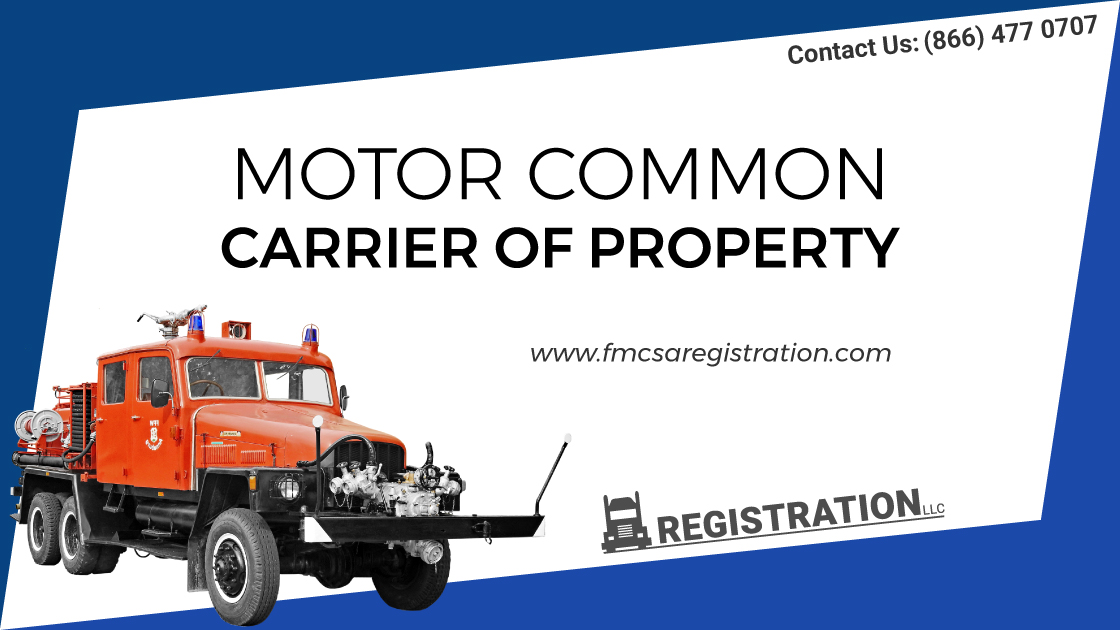
The FMCSA can classify a carrier as a Motor Common Carrier of Property. So, what does a common carrier with this FMCSA classification do? It hauls items and goods. But that’s not all. A common carrier can also carry passengers. This applies to working on behalf of any customer or broker.
A common carrier can find brokers online using a load board.
If you're a common carrier, your mission is to secure high-paying loads. And our organization can help you do so. Please get in touch with us if you're a common carrier needing help with any aspect of trucking. Let’s review the basics of a Motor Common Carrier of Property. Must visit BOC-3 Filing .
What Is a Motor Common Carrier of Property (Except Household Goods)?
Think of a Motor Common Carrier of Property (Except Household Goods) as you would any carrier. This type of motor carrier transports FMCSA-regulated commodities. But there’s one exception. The FMCSA excludes household goods from “regulated commodities.” A motor carrier transports the commodities on behalf of the general public. In exchange, the airline receives payment. The payment refers to the specific published tariff rates.
Motor Common Carriers of Property (Except Household Goods) must make a crucial filing.
They have to file proof of public liability using insurance. This refers to BI: bodily injury and PD: property damage. A common carrier of this type must also have active cargo insurance through the FMCSA. Otherwise, a carrier cannot receive interstate Operating Authority. The key to getting an Operating Authority is filing an FMCSA Form OP-1. Please get in touch with our organization for help filing Form Op-1. We can answer your questions and even file the form on your behalf. Check out UCR registration.
What Is a Contract Carrier With Contract Authority?
A contract carrier works with select customers of three different classifications. These are shippers, freight forwarders, and brokers. Each contract carrier hauls property for specific customers. Oftentimes, a carrier has developed a strong working relationship with customers. Many contract carriers do not need to find cargo on load boards every week. Instead, they focus on hauling goods for long-time clients. Read the Step-By-Step Process for Securing a Texas DOT Number .
Contract carriers specialize in providing for-hire truck transportation.
They do so for individual and specific shippers. The terms of each shipment of property go inside the contracts. Every contract carrier has to file liability insurance (BI and PD). But this type of carrier does not have to file cargo insurance. That is not the case with common and contract motor carriers of household goods. They have to file both liability and cargo insurance. That is an official FMCSA and USDOT rule for common and contract carriers. Visit Trucking Operating Authority Packages
What Is Common Carrier Authority?
Common authority is crucial to secure for many carriers in interstate trucking. These are carriers that perform for-hire transportation. They do so for the general public. A common carrier has to file cargo and liability insurance. Otherwise, the FMCSA will not allow a carrier to operate vehicles. This concept of authority is different than that of contract authority. Must visit Unified Carrier Registration ,
Contract authority is for carriers that perform for-hire transportation.
They do so for certain individual shippers. The terms of the transactions get based on contracts. Meanwhile, a common carrier gives the general public for-hire truck transportation. That’s why a common carrier does not have to file cargo insurance. Although it must file BI & PD liability insurance. Read about FMCSA Registration Regulations Service.
What Is the Difference Between a Motor Common Carrier and a Contract Carrier?
A common carrier concentrates on providing truck transportation (for-hire) to the public. Per the FMCSA, each common carrier must file two types of insurance. There’s cargo insurance and liability (BI & PD) insurance. Contract carriers also provide for-hire truck transportation. But they only do so for individual, specific shippers. The terms of each shipment go inside contracts. There is not that much of a difference between common and contract carriers. Check out Driver Qualification Files .
As of 2018, the FMCSA stopped focusing on distinguishing these carriers.
Both classifications can now apply under the for-hire designation. This refers to motor carriers of property authority. The carriers get paid to transport regulated property. And that property’s owned by a third party. Of course, it’s best to check with the FMCSA about what type of authority your carrier needs. Or, you can contact our organization.
We specialize in helping carriers fill out the correct FMCSA and DOT documents.
This way, a motor common carrier can secure authority ASAP. Visit FMCSA Registration .
The Insurance of Common & Contract Carriers
When it comes to insurance, common and contract carriers must have liability coverage. This is a legal requirement by the US federal government. The standard amount of coverage is $750,000. But say that your carrier transports hazardous materials. A coverage amount of either $1 million or $5 million must get put in place.
Neither contract or common carriers have a legal obligation to secure cargo insurance.
But our organization recommends that each carrier should have it. Why? Because a customer won’t hand over freight if the freight isn’t insured. The amount of cargo insurance can vary. It often depends on what a carrier’s customer has in mind.
What Is a Motor Vehicle Carrier?
Here’s how the FMCSA defines a motor vehicle carrier. A motor carrier transports property or passengers for income. So, who arranges the transportation of property for compensation? A broker. But brokers never transport property or take responsibility for property. That’s the role of a motor vehicle carrier. Visit DOT Audit .

What Is a For-Hire Motor Carrier?
Each for-hire motor carrier secures official authorization from both the FMCSA and DOT. A for-hire motor carrier transports three different classifications. It transports either property, passengers, or household goods that others own. All three get transported for compensation. Say that you work for a new for-hire carrier. Your carrier must secure a USDOT Number .
That carrier will also need to get official FMCSA Operating Authority.
Any carrier can do so by securing an MC Number. Please let our organization know if you need help getting an MC Number. Or, if we can assist you with securing Operating Authority. We help thousands of carriers each month get (and maintain) FMCSA Operating Authority. Also check out FMCSA Registration Trucking ,
What Is a Motor Carrier of Household Goods (Moving Companies)?
This type of carrier is for-hire and gets authorized by the FMCSA. This way, the carrier can transport only household goods. It does so for the general public in exchange for compensation. So, how does the FMCSA define “household goods?” These goods serve as personal items that get used inside a home. The goods include property that gets shipped from a store or factory. The householder requests that the goods get transported. Then, the householder pays the carrier transportation charges. When to Update Your MCS-150 .
Any Motor Carrier of Household Goods has to file two types of insurance.
First, there is BI and PD proof of public liability. Then, there’s the filing of cargo insurance through the FMCSA. Common carriers have to show proof of both types of insurance to the FMCA. Otherwise, a carrier cannot secure Operating Authority. What is IRP ?
What Is Considered a Common Carrier?
US law defines a common carrier as either a public or private entity. It’s a carrier that transports goods or property for money from one place to another. Please contact our organization today if you need more information. We can help your carrier make crucial filings like FMCSA Form OP-1. This way, your carrier can secure and maintain 100 percent USDOT authority .
What Is a Property Carrier?
Here is the FMCSA’s official term for a party carrier. It’s a Motor Carrier of Property (except Household Goods). You can find more information on the FMCSA OP-1 form. Or, you're welcome to contact our organization.
This type of motor carrier is for-hire and transports regulated commodities.
But this classification of carrier doesn’t transport household goods. A property carrier moves certain property for the general public. Each customer then pays a property carrier once the shipped property arrives. Visit Starting a Trucking Company Correctly.
What is an Exempt Motor Carrier?
Every exempt for-hire motor carrier transports exempt property. But wait, what does “exempt property” mean? It refers to property that’s unregulated by the FMCSA. Others own this type of property. An exempt carrier moves the property for compensation. Most exempt commodities have an unmanufactured status. Or, the commodities serve as unprocessed goods. Vegetables and fruits are two examples of this type of property. Exempt property often refers to individual items that have little or no value. Visit the DOT Compliant Drug and Alcohol Program.
Do You Work for a Motor Common Carrier of Property? Contact Us Now for Help
One key mission of our business is to help every Motor Common Carrier of Property. We never rest until each carrier achieves complete document filing and business success. That’s why you're welcome to contact our organization. You can pick up the phone and call our number right now. Or, we're ready for you to send us an email or message us on our website. Our experts can help you with any aspect of FMCSA filing, from OP-1 instructions to securing a USDOT Number for authority. We can even help your carrier connect to brokers using load boards. No matter your trucking problem, we’ll help you find a long-lasting solution. Visit also Motor Carrier Authority.